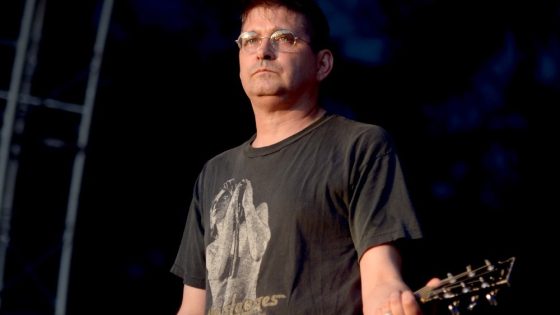Steve Albini, a leading light of indie-rock’s sound and morality as frontman of Big Black and Shellac and recording engineer for Nirvana, PJ Harvey and many other artists, has died at the age 61. The news was confirmed to Variety on Wednesday by Taylor Hales, who works at Albini’s Chicago recording studio, Electronic Audio; no cause of death was provided.
Albini first rose to acclaim in the early 1980s as the frontman for Big Black, the Chicago-based trio known for aggressive guitar-based rock that worked with a drum machine rather than a live drummer, a rarity for the time. Yet he was also well known for his equally aggressive criticism of musicians and others who he felt were in it for money or popularity rather than the music — and he walked it like he talked it. He reviled the term “producer,” even if that’s arguably what he did on many recordings, and insisted on a “Recorded by Steve Albini” credit. He also refused to take any “points” — i.e. royalties, a common financial bonus for most top producers — from the recordings he worked on.
His at-times iconoclastic stance — and his galvanizing work on the Pixies’ landmark 1988 album “Surfer Rosa” — endeared him to Nirvana’s Kurt Cobain, who insisted that the band work with Albini on its second major label album, 1993’s “In Utero,” to the chagrin of their label, which was hoping for another speaker-shattering blockbuster similar to the group’s breakthrough, “Nevermind.” (“In Utero” was plenty loud, but not in the radio-friendly way they’d been angling for.) Around the same time, Albini also recorded PJ Harvey’s sophomore effort “Rid of Me,” which had a similarly aggressive sound.
Albini also worked with acts such as the Breeders, Slint, Helmet, the Jesus Lizard, Jon Spencer, the Dirty Three and even former Led Zeppelin members Jimmy Page and Robert Plant on their 1998 album “Walking Into Clarksdale.” The latter album in particular benefited from Albini’s spare, no-frills sound, which was at odds with the duo’s elaborate latter-day recordings.
In the early 1990s Albini formed the band Shellac, which released five studio albums over the years and was preparing for a tour later this year to support their sixth full-length — and first in a decade — “To All Trains,” which is scheduled for release next week.
He was also the founder, owner and principal engineer at Electrical Audio, a recording studio complex in Chicago. Even now, Albini was still consistently taking up production gigs for a flat fee, refusing royalty payments in a show of support with his indie artists.
Albini was born on July 22, 1962 in Pasadena, Calif. His family moved frequently before settling in Missoula, Montana, where Albini discovered the Ramones as a teenager. While studying journalism in Illinois, he became involved in Chicago’s vibrant punk-rock scene, which he never really left.
He began recording as Big Black in 1981 and played nearly all of the instruments on the group’s acerbic first release, the “Lungs” EP in 1982. The lineup solidified around Albini, guitarist Santiago Durango and bassist Jeff Pezzati and the group quickly became popular and active on the burgeoning U.S. indie-rock scene, releasing three EPs and two full-length albums before splitting in 1987. While Albini and the band were sometimes considered iconoclastic and judgemental — and often were, particularly in the diatribes Albini wrote for fanzines like Matter — their music was a vast influence on left-leaning hard rock for decades to come, from Godflesh in the late ‘80s to Idles today; an ‘80s band called Head of David began the thank-you list on their debut album with “Big Black Sabbath.”
Also often overlooked was the band’s sense of humor — their final album was called “Songs About Fucking”; their last single featured covers of songs by Kraftwerk and Cheap Trick and its sleeve showed the band comically dressed as those artists — but some attempts at humor did not land well: Albini’s first post-Big Black band bore the unfortunate name of Rapeman, which he later regretted. While he argued that the ironic intent of his lyrics for songs with titles using deeply offensive terms — not to mention a limited-edition Big Black album cover with an autopsy photo of a suicide by gunshot blast — should be obvious, that distinction certainly was not always clear at first impression. He admitted as much later in life.
“A lot of things I said and did from an ignorant position of comfort and privilege are clearly awful and I regret them. It’s nobody’s obligation to overlook that, and I do feel an obligation to redeem myself,” Albini wrote on X (formerly Twitter) in 2021. “If anything, we were trying to underscore the banality, the everyday nonchalance toward our common history with the atrocious, all while laboring under the tacit mistaken notion that things were getting better. I’m overdue for a conversation about my role in inspiring ‘edgelord’ shit. Believe me, I’ve met my share of punishers at gigs and I sympathize with anybody who isn’t me but still had to suffer them.”
Around the time of his success with Nirvana and PJ Harvey, he formed Shellac with bassist Bob Weston and powerhouse drummer Todd Trainer. The band recorded and toured extensively throughout the 1990s and ‘00s. In his later years, Albini settled into a workday life in Chicago, working unselectively with most of the artists who asked, touring and releasing albums with Shellac and becoming a very successful professional poker player. In 2018, he won a World Series of Poker gold bracelet with a prize of over $105,000 — and nearly doubled that jackpot with a second victory four years later.
Source Agencies


